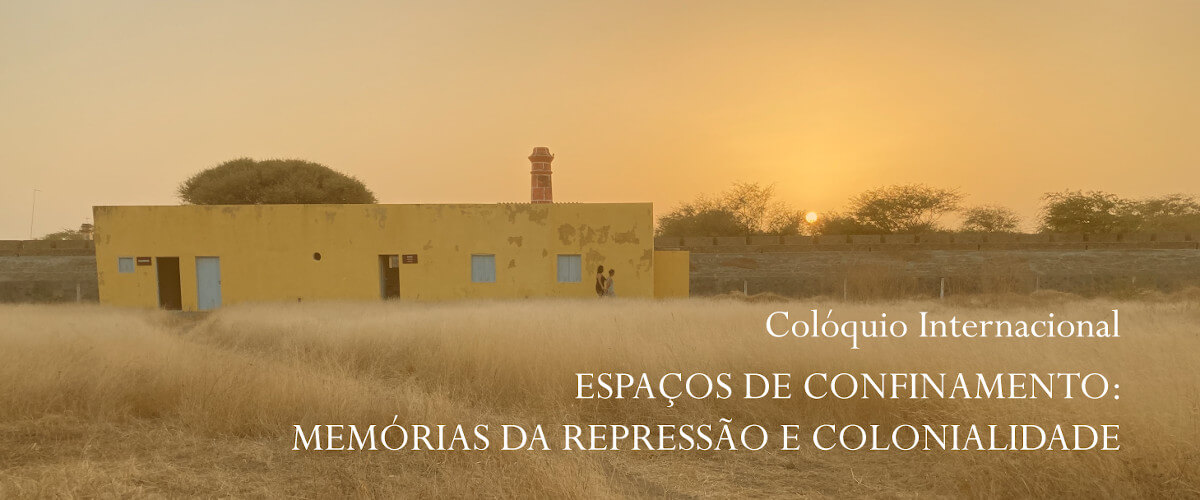outubro, 2024

Detalhes do Evento
Colloquium that aims to extend the discussion on the camp form from a historical perspective, as well as the different practices of colonial incarceration. Spaces of Confinement: Memories
Ver mais
Detalhes do Evento
Colloquium that aims to extend the discussion on the camp form from a historical perspective, as well as the different practices of colonial incarceration.
Spaces of Confinement:
Memories of Repression and Coloniality
Last May 1st marked the 50th anniversary (1974-2024) of the liberation of prisoners held in the Tarrafal Concentration Camp on the island of Santiago in Cape Verde. This camp was founded by the Salazar dictatorship in 1936 under the euphemistic name of ‘Cape Verde Penal Colony’ with the purpose of imprisoning the opponents of Salazarism. From 1936 to 1954, hundreds of Portuguese prisoners were confined to Tarrafal for political reasons; and hundreds more from the colonies were confined from 1961 to 1974 because they fought for the independence of their country in Africa. Torture, illness, death, censorship, forced labour and other repressive practices characterized the regime of confinement in Tarrafal (Barros 2009). From this point of view, the history of this prison should be seen as part of the global policies of colonial confinement and political violence that dictatorial regimes carried out in different parts of the world throughout the 20th century. Furthermore, this colonial confinement needs to be seen as part of the global history of European imperial expansion and colonialisms (Coates
2001; Bernault 2003; Vansina 2003; Havik, Janeiro, Oliveira & Pimentel 2021; Bruce-Lockhart 2022; Angelo 2023).
Detentions (as a practice of control) and segregation (as a mechanism for generating differences) were exercised in spaces instituted as ‘exceptions’ (Agamben 1996) and as instruments for managing people considered to be ‘surplus’ or dangerous to the dominant order. The concept of camp form suggested by Federico Rahola in a 2007 implies a reinterpretation of colonial and post-colonial confinements, both from the perspective of their duration and the contemporary adaptation of detention practices, including what Didier Fassin calls ‘precarious transnational nomads – refugees or migrants, asylum seekers or foreigners in an irregular situation’ (Fassin 2021). That is to say, the spaces and cultures of confinement (Dikötter & Brown 2007; Morelle, Le Marcis & Hornberger 2021) reveal a lot about the geographies of exclusion and inequality (Gilmore 2023).
Taking as memorial reference the 88th anniversary of the opening of the Tarrafal colonial prison in Cape Verde (29 October 1936 – 29 October 2024), this International Colloquium aims to extend the debate on the old and new practices of confinement, in their multiple declinations and modalities. On the one hand, it aims to extend the discussion on the camp form from a historical perspective, as well as the different practices of colonial incarceration. On the other hand, the purpose of this Colloquium is to reflect in a broad and transdisciplinary way on the spaces, memories, narratives and experiences of detention, and how their legacies mark the genealogy of contemporary practices of detention.
Call for papers
In this context, we call for proposals that dialogue with these and other related topics:
- Colonial confinement experiences
- Memories and narratives of detention
- Prison and political repression
- Colonial and post-colonial violence in the field
- Arts, violence, narratives and representations of confinement
- Prisons, resistance strategies and transnational networks of struggle
- Archipelagos of confinement: political prisons, penal colonies, forced labour camps, refugee camps
- Spaces and forms of confinement – comparative perspectives
- Memory policies, reappropriations, ways of reusing spaces of colonial confinement
- Racialised spaces and the compartmentalisation of difference
Proposals (title, author, institutional affiliation, and an abstract of no more than 200 words) must be sent by 10 August 2024 to liviaapa@gmail.com and vbarros@fcsh.unl.pt. Accepted proposals will be communicated no later than 1 September 2024. Abstracts and presentations can be in Portuguese, English, French or Spanish.
The Colloquium will take place on 29 and 30 October 2024 at the Aljube Museum, in Lisbon, Portugal.
>> Download the call for papers (PDF) <<
Organisation
Livia Apa (CEsac-Unior – Centro Studi sull’Africa Contemporanea, Università di Napoli)
Víctor Barros (IHC — NOVA FCSH / IN2PAST)
Scientific Committee
Anaïs Angelo (University of Vienna)
Aurora Almada e Santos (IHC — NOVA FCSH / IN2PAST)
Camille Evrard (CNRS–IMAF & Université de Toulouse Jean Jaurès)
Catarina Madeira Santos (IMAF & École des Hautes Études en Sciences Sociales)
Federico Rahola (Università degli Studi di Genova)
Florence Bernault (SciencesPo – Centre for History)
Francesco Correale (CNRS–UMR 7324 CITERES – Université de Tours)
Laura Routley (Newcastle University)
Maria Conceição Neto (Universidade Agostinho Neto)
Miguel Mellino (Università degli Studi di Napoli « L’Orientale »)
Pedro Aires Oliveira (IHC — NOVA FCSH / IN2PAST)
Romain Tiquet (CNRS & Centre Marc Bloch)
Photo: Tarrafal Concentration Camp (© Víctor Barros)
Tempo
28 (Segunda-feira) 10:00 am - 30 (Quarta-feira) 4:00 pm
Localização
National Library of Portugal and Aljube Museum - Resistance and Freedom
Lisbon
Organizador
Several Institutions

